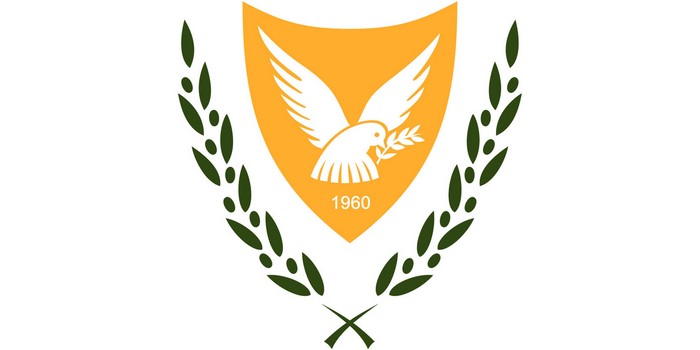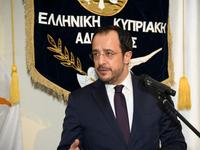Press Releases

13-04-2018 11:13
Address by the President of the Republic of Cyprus at the "Satisfying increased demand for capacity while maintaining safety/special challenges for East Mediterranean and Middle East regions" regional seminar
The President of the Republic of Cyprus, Mr Nicos Anastasiades, wished very much to be with you today, but some unexpected urgent matters prevent him to do so. Nevertheless, he asked me to convey to you his best wishes and read the following address on his behalf
It is a pleasure to address such an important event, with so many speakers from practically the whole international aviation community and so many participants from all sectors of air transport. Let me welcome in particular those of you who have travelled from abroad to be in Cyprus today and wish you all a pleasant stay.
I would like to congratulate the “Mediterranean Flight Safety Foundation” and the “European Association of Aviation Training Organizations”, both based in Cyprus, for organizing jointly this important Seminar . I would also like to express my thanks to them for their substantial contribution to the enhancement of safety and air transport in general, in the Eastern Mediterranean and Middle East regions and beyond.
Air transport is universally recognized as the most important mode of transport for connecting people, countries and regions, irrespective of distance, and bridging gaps between land and sea alike. It is an important tool for economic, commercial and social development of countries, connecting places of production to places of consumption, providing unparalleled speed for the transport of goods, services and people.
In 2017 there have been almost 40 m. flights globally, which transported 3.7 billion passengers. This figure is expected to double in the next twenty five years.
Yet, despite these impressive statistics and the technical, operational and other complexities in managing this huge and still increasing number of flights, air travel continues to be the safest mode of transport and its safety performance is improving year after year. In 2017 there was no major accident of a commercial aircraft and zero fatalities.
Of course, this performance would not have been achieved had it not been for the sustained improvements in effective international and national supervision, technology, procedures, training and above all the improved regional and global cooperation between all states and regions, as well as all the parties in the aviation industry. I stress the word cooperation, since it is the key to the future development of aviation in general and flight safety in particular. After all, air travel is by its nature a transnational and interregional activity. Therefore, its development can only be achieved by the adoption of a multilateral and cooperative approach.
At institutional level, international cooperation is conducted globally within the framework of the International Civil Aviation Organization (ICAO). The orderly and safe operation of the complex, multifaceted and rapidly changing global civil aviation system cannot be achieved outside the legal and internationally accepted framework of ICAO and the strict implementation of all its regulations.
If we now turn to Europe, it is also evident that without the cooperation of all European States within the framework of the policies and regulations of the European Union, EUROCONTROL, ECAC, EASA and other bodies, the tremendous progress that has been achieved in the last years would not have been possible, neither would it be possible to accommodate safely the continuously increasing number of flights.
I consider that it is the duty of all States to operate within this international and European legal framework and make every effort to contribute to the enhancement of safety of the billions of persons who travel by air every year.
I would like to state with great satisfaction and commitment that Cyprus, as a Member of ICAO, the EU and EUROCONTROL, fully adheres to international law and the regulations of all these Institutions. Moreover, we are active in promoting their policies, especially those relating to regional cooperation. Just to mention one example, together with Italy, Greece and Malta, Cyprus participates in the Single European Sky Programme, which constitutes the most important pillar of the EUs strategy in aviation.
Furthermore, we are convinced that Cyprus, as the only country in the region that is a Member of the European Union and EUROCONTROL, can and is willing to play a leading role in facilitating regional cooperation .
Let me now refer briefly to civil aviation in my country: As you know, following the Turkish invasion of Cyprus in 1974, along with the devastation of practically all sectors of the economy, civil aviation suffered total destruction. The Nicosia Airport, the only one on the island at the time, was destroyed and became totally inoperable. The air traffic control and communication systems and practically all aviation infrastructures were destroyed.
Yet, despite this devastation, we have managed to gradually rebuild the sector and today civil aviation in Cyprus is very much comparable with that of any other European state. We are proud to say that we have now two modern international airports, one in Paphos and one in Larnaca, handling more than 10.m passengers every year.
A new state-of-the-art air traffic control system will be installed soon, complementing the modern radars and other facilities which are already in operation.
In addition to the above, we are in the final stages of restructuring and upgrading the Civil Aviation Department, in order to maximize its flexibility and overall efficiency, as well as improving its regulatory functions.
It is worth noting, ladies and gentlemen, that unlike any other European country, Cyprus is adjacent to five non-European countries and two continents. Its Flight Information Region is the first point of entry and exit for most traffic between Europe, the Middle East and the Far East. This, as you may realize, makes coordination and interoperability in air traffic control much more difficult and therefore our air traffic controllers are faced with additional challenges in comparison with their colleagues in the rest of Europe.
However, despite these challenges, in 2017 our civil aviation authorities managed safely in the Nicosia FIR 400.000 flights, carrying some 60 million passengers. For a small country like Cyprus, these are impressive figures.
Nevertheless and despite our efforts and the considerable improvements we have achieved, there are certain exogenous issues which are of great concern to us. I am referring of course to the issue of the dangers in safety, resulting from the attitude of Turkey. More precisely:
- The refusal of Turkey to cooperate with our air traffic control services, contrary to the relevant provisions of the ICAO Convention.
- The existence of the illegal airport and control centre in the occupied part of Cyprus and its interference with flights in the Nicosia FIR.
- The flights of the Turkish air force that operate in the Nicosia FIR without any coordination with the legal aviation authorities of Cyprus.
- The illegal issuing of NOTAMS by Turkey.
- The prohibition of flights from Cypriot airline companies to use the Turkish airspace. It is noted here that overflights of Turkish airlines use the Cyprus national airspace and the Nicosia FIR without any hindrance.
Regrettably, these illegal actions of Turkey create serious dangers to the safety of millions of passengers (the majority of them European), who travel with flights using the Nicosia FIR.
This is not only our concern, but also an issue of great concern to ICAO, the EU, EUROCONTROL, IFALPA, IATA and others, as it has repeatedly been stated in their own reports.
Even when ICAO, EUROCONTROL and the European Commission tried to find a minimum technical arrangement, which could alleviate to some degree the problem, the Turkish position was negative.
I would like to repeat, ladies and gentlemen, that the position of the Government of Cyprus on this issue is not one that is based on political exploitation and expediency, though evidently it has to do with international law, but to ensure the safety of millions of passengers and flights within the internationally recognized Nicosia FIR. We shall continue to make every effort in that respect and we expect the international community and all those involved in aviation to do likewise in a practical and effective manner.
The only thing that nobody is entitled to do is to simply allow the present situation to continue. The fact that no accidents happened so far, should not lead to complacency.
Let me conclude my short intervention by saying that everybody involved in civil aviation has a very important role to play. Safety should be the top priority for everyone and it is a task that should never be taken for granted.
I welcome you again in Cyprus and wish you every success to your Conference.
** The address was delivered on behalf of the President of the Republic by the Government Spokesman Mr Prodromos Prodromou.
(RM/ML/II)
Relevant Press Releases

19-04-2024 16:42
PIO e-mail Αlerts service is suspended




14-04-2024 12:45
Statements by the President of the Republic


